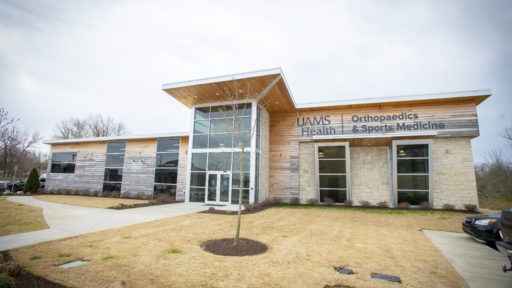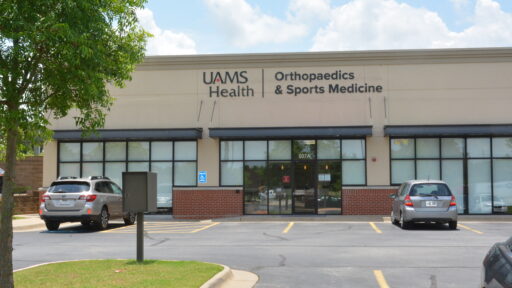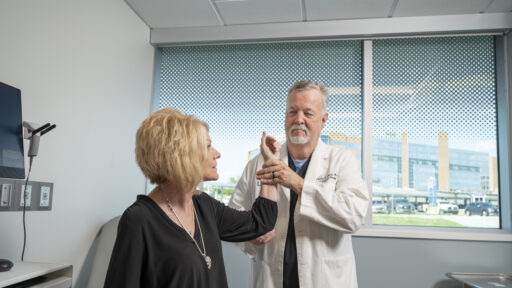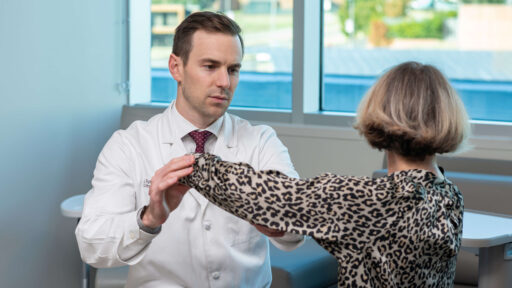Description
Wesley K. Cox, M.D., an orthopaedic surgeon with UAMS Health, gives information about shoulder instability.
Video Player
Transcript
[Dr. Wesley Cox, M.D., Fellowship-Trained Shoulder and Elbow Surgeon]
One thing that we see a lot of is shoulder instability, which is the tendency for the ball — if you will — to fall of the socket or dislocate. For some people, it dislocates all the way. For some people, it feels like it’s going to dislocate. Some people are made that way. Sometimes, people will get it in a traumatic event, whether it’s a fall or a tackle or something of that nature.
But it doesn’t have to be traumatic. For many patients, it is, but some patients, their shoulder just feels loose. A traumatic instability is very different than someone who just has loose shoulders. And the majority of the time, someone who just has loose shoulders can rehab their way out of that, whether it’s through a specific strengthening program or working on some physical therapy for their shoulder blade to get the shoulder blade muscles stronger — can solve for that for most patients for don’t have a traumatic event leading to their instability.
But it’s very different, depending on how old you are when you have your first instability episode, what kind of activities you’re doing, and so forth. The treatment for me, as opposed to a 16-year-old contact athlete, is very different if we have a first-time dislocation.
It’s also different for grandparents who might tear something totally different than a tennis player might with an erroneous swing or something, just a stroke of bad luck.
So, first thing, you have to figure out why they’re unstable. If it’s unstable from trauma, those often need surgery. It just depends on how you got there.
Understanding the anatomy of why shoulders are unstable, I think helps a lot. The way I tell patients is to think about a golf ball and a golf tee — and the ratios are pretty similar. Any defect in the tee, that ball is going to fall of really easily. The socket is very flat. It doesn’t have much of a cup. Around it, there’s some soft tissue — we call it the labrum, it’s almost like gristle — that’s sort of like the gutters or the bumpers in a bowling alley. It’s not a wall. The ball can get over it, just like it can in bowling. But it encourages the head back to the center. So, it makes a little bit of a flat surface, a little bit more like a dish.
And there are ligaments that attach to that labrum, or that cartilage that goes around that shoulder. I describe it like a rope that’s hooked to something. Well, if the hook breaks, it’s a hook problem, but it becomes a rope problem. So, most of the times, when people dislocate their shoulder, the labrum around the socket tears. So, then, the ligament that attaches to that labrum is now loose like a rope laying on the ground. And so, the only way you get that tension back is to sew it back down from where it was torn.
But labral tears aren’t dangerous. So, you could have a labral tear, and if your shoulder is not unstable, and you meet certain criteria, you do not need a surgery. In the absence of instability, if you have one dislocation when you’re 45 years old, it doesn’t mean you have to run to surgery and have that fixed. We rehab those people. We try to get them better without surgery. And a lot of patients can do well without surgery.
Young contact athletes, though, do not do very well without surgery in the long run. We’re learning more and more about long-term sequela and the consequences of recurrent dislocations in young contact athletes. And so, we want to do everything we can to avoid that, having an arthritic shoulder 30 years from now. So, we’ll ask a lot of questions about — for the young dislocator — what kind of questions do you play, are you going to continue to play those sports?
For some young patients who aren’t even in sports, surgical treatment is still a consideration, fortunately.
We fix these, generally, arthroscopically. There are some surgeries that we do to reconstruct the sockets, so if you lose much of the bone of the ball or the socket in a dislocation, that obviously has to be addressed, too. But it’s very addressable. And when you address all the components of why it dislocates, then the surgical outcomes are very good.
Our goal, still, though, is to have the shoulder stable without surgery. So, for the patient who did not get a loose shoulder because of trauma, we are going down swinging to get you better without surgery. There are specific rehab programs that have been proven to work, and we are all-in on that. The good news is, those rehab programs also speed recovery if you end up having surgery, ultimately. And so, getting people back to doing what they’re doing.
Whether it’s me or a 16-year-old tennis player or a collegiate football player, shoulder dislocations can happen for a variety of reasons. Figuring out why they happen is how we know how to best fix them, and we’ll help you with that.





